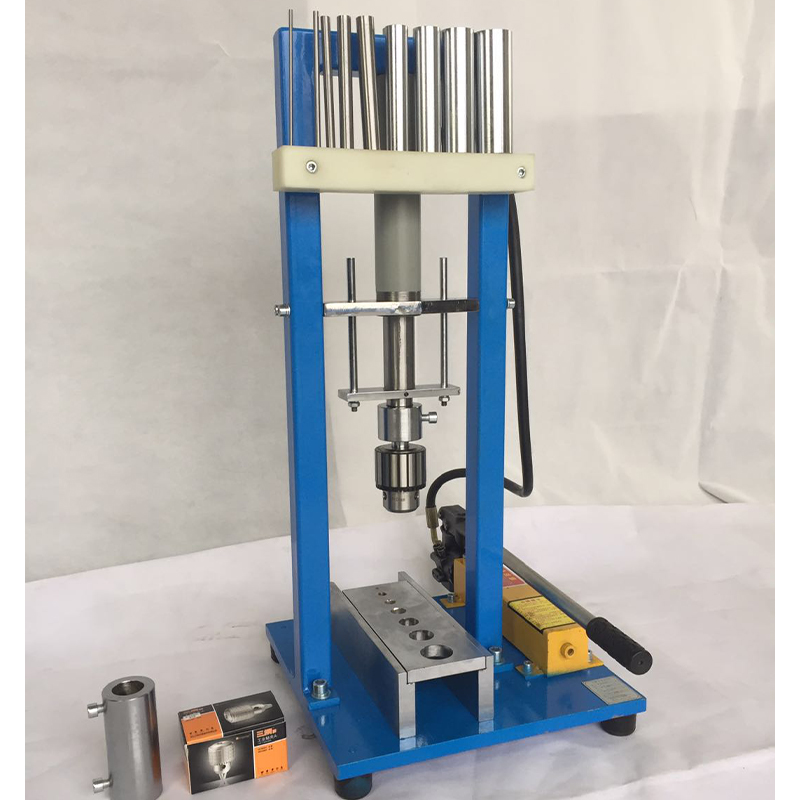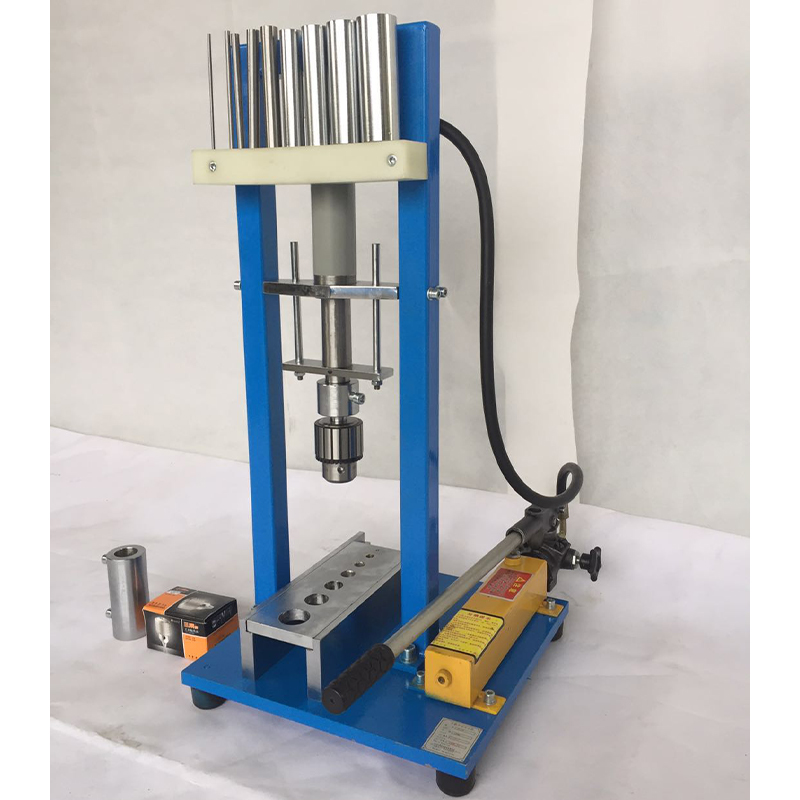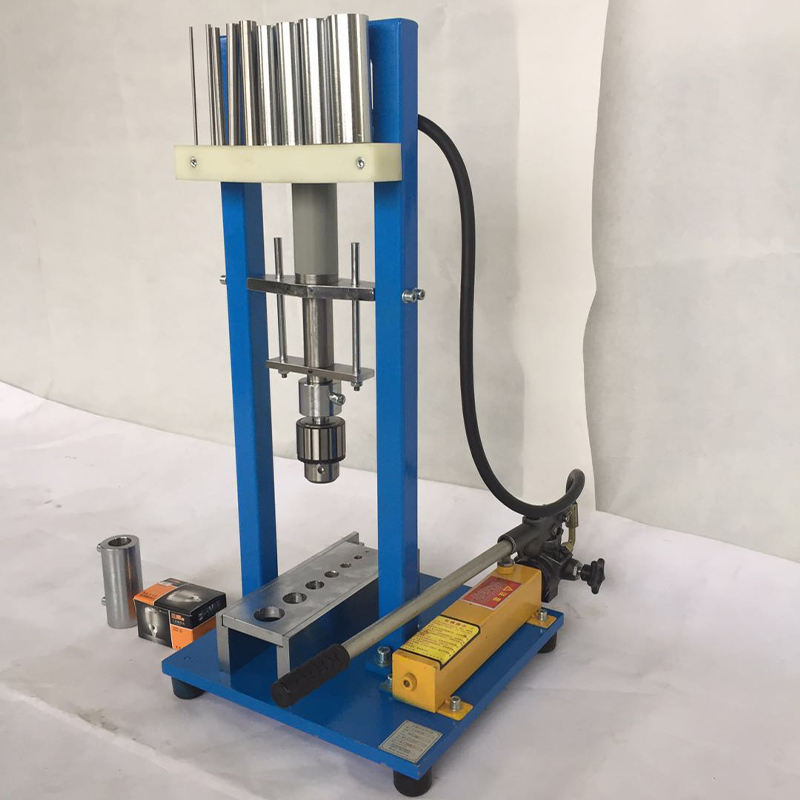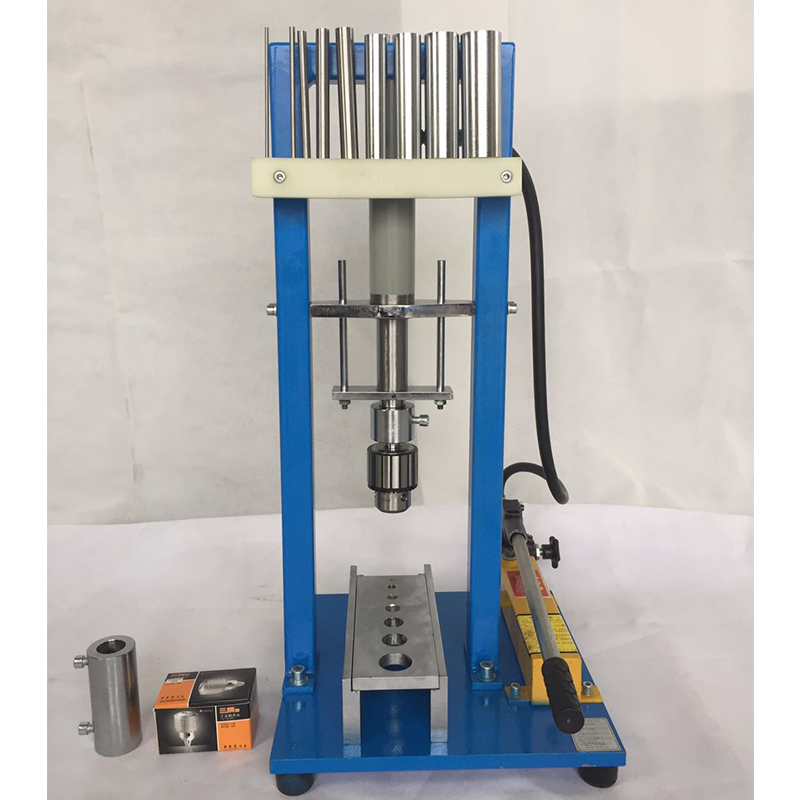CX-100 Manual Hydraulic Core Punching Machine - Efficient & Reliable
In the demanding landscape of industrial material analysis and quality control, precision and reliability are paramount. The need for accurate sample preparation, particularly for tensile, compression, or other mechanical property tests, drives the innovation in equipment design. This article delves into the capabilities and strategic advantages of the CX-100 Manual Hydraulic Core Punching Machine, a critical instrument designed for unparalleled performance in core material extraction. We will explore its technical prowess, applications across diverse sectors, and its role in enhancing the accuracy and efficiency of material characterization processes.
Industry Trends and the Evolving Demand for Precision Punching
The global industrial sector is experiencing a significant shift towards more rigorous quality assurance protocols and advanced material science. Industries such as petrochemicals, metallurgy, electrical cable manufacturing, and water supply & drainage are increasingly reliant on the precise mechanical testing of materials to ensure product integrity, safety, and performance longevity. This trend necessitates highly accurate and repeatable sample preparation methods. Traditional methods often involve cutting or sawing, which can introduce thermal stress, deformation, or micro-cracks, potentially compromising the true material properties. As a result, there's a growing demand for specialized tools that can extract samples cleanly and accurately without altering their intrinsic characteristics. The market is trending towards solutions that offer not only precision but also ease of operation, durability, and compliance with international testing standards. The CX-100 Manual Hydraulic Core Punching Machine is engineered to meet these exacting requirements, providing a reliable solution for producing pristine core samples for a myriad of analytical purposes.
Recent industry reports indicate a steady growth in the material testing equipment market, projected to reach over $7 billion by 2027, driven by stringent regulatory frameworks and the development of new materials requiring advanced characterization. Manual hydraulic punching machines, while seemingly low-tech, offer a critical advantage in specific applications where power sources are limited, or precise, controlled force application is preferred over high-speed automation, particularly for sensitive or brittle materials. This positions instruments like the CX-100 as indispensable tools in both field testing and laboratory environments, contributing significantly to quality control and R&D efforts.
Detailed Process Flow and Manufacturing Excellence
The robust performance and extended service life of the CX-100 Manual Hydraulic Core Punching Machine are directly attributable to its meticulous manufacturing process and the selection of high-grade materials. The production begins with raw material sourcing, adhering to strict quality specifications to ensure optimal mechanical properties in the final product.
Key Manufacturing Steps:
- Material Selection: High-strength alloy steels are primarily used for critical components such as the hydraulic cylinder, piston, and punching dies. These materials are chosen for their superior wear resistance, tensile strength, and fatigue life. For parts requiring corrosion resistance, such as the outer casing or specific internal components exposed to potential contaminants, stainless steel or surface-treated carbon steel (e.g., hard chrome plating) is utilized. This ensures the machine's integrity in harsh industrial environments, particularly relevant for target industries like petrochemicals and water supply & drainage.
- Precision Casting and Forging: The main hydraulic body and critical structural elements often undergo precision casting or hot forging processes. Casting ensures complex internal geometries for efficient fluid dynamics, while forging enhances material density and grain structure, leading to exceptional strength and durability for components under high stress. This foundational step is crucial for the hydraulic system's longevity and leak-free operation.
- CNC Machining: Following casting or forging, all critical components are subjected to advanced Computer Numerical Control (CNC) machining. This ensures extremely tight tolerances for parts like the punching dies, plunger, and cylinder bore. Precision machining is vital for achieving the exact alignment required for a clean, burr-free punch and for maintaining the integrity of the hydraulic seal, preventing pressure loss and ensuring consistent punching force. The accuracy of the die-punch interface directly impacts the quality of the extracted core sample.
- Heat Treatment: Key components, especially the punching dies and contact surfaces, undergo specialized heat treatment processes, including hardening, tempering, and nitriding. This significantly increases their surface hardness, wear resistance, and overall fatigue strength, extending the service life of the machine even under continuous heavy use.
- Surface Finishing and Corrosion Protection: Components are treated with anti-corrosion coatings, such as industrial-grade paints, powder coatings, or specialized electroplating (e.g., nickel-chrome plating). This protective layer is critical for operating environments where exposure to moisture, chemicals, or abrasive particles is common, thereby enhancing the machine’s longevity and maintaining its aesthetic and functional integrity over its projected 10-15 year service life.
- Assembly and Calibration: The machine is assembled by skilled technicians, with careful attention to hydraulic connections and mechanical alignments. Each unit undergoes rigorous calibration to ensure the hydraulic pressure system delivers the specified punching force accurately and consistently.
Testing Standards and Quality Assurance:
Every CX-100 unit is subjected to stringent quality control tests. This includes hydraulic pressure tests, dimensional accuracy checks of punched samples, and endurance cycling tests. Compliance with international standards such as ISO 9001 for quality management systems and relevant sections of ANSI standards for mechanical testing equipment ensures that the machine not only performs as expected but also adheres to global benchmarks for safety and reliability.
This meticulous manufacturing and testing regimen ensures the machine's advantages in typical application scenarios, such as its inherent energy-saving capabilities (as it requires no external power source, relying solely on manual hydraulic force) and its robust corrosion resistance, making it an ideal choice for challenging industrial settings.

Figure 1: Precision-engineered components of the CX-100 Hydraulic Core Punch.
Technical Specifications and Performance Parameters
Understanding the detailed technical specifications of the CX-100 Manual Hydraulic Core Punching Machine is crucial for assessing its suitability for specific industrial applications. This machine is designed for robust performance, delivering consistent and reproducible results for core material extraction.
Product Specification Table: CX-100 Manual Hydraulic Core Punching Machine
| Parameter | Kufotokozera |
|---|---|
| Product Name | CX-100 Manual Hydraulic Core Punching Machine |
| Punching Force | Up to 100 KN (approximately 10 tons) |
| Core Diameter Range | Standard dies for Ø10mm, Ø12mm, Ø15mm, Ø20mm (Customizable) |
| Maximum Material Thickness | Up to 25 mm (depending on material hardness) |
| Applicable Materials | Rubber, Plastics, Composites, Soft Metals, Cable Sheathing, Gaskets, Paper, Fabrics |
| Operation Mode | Manual Hydraulic Pump |
| Hydraulic System | Integrated, self-contained oil circuit with pressure release valve |
| Dimensions (L x W x H) | Approx. 400mm x 200mm x 500mm |
| Kulemera | Approx. 45 kg |
| Construction Material | High-strength alloy steel with corrosion-resistant finish |
| Safety Features | Enclosed punching area, pressure relief valve, stable base |
| Certifications | CE Compliant (Manufacturer's Declaration), ISO 9001 Manufacturing Process |
The robust design and significant punching force of 100 KN enable the CX-100 to handle a wide array of materials, from soft rubbers and plastics to harder composites and thin metals, ensuring clean and precise core extraction. The manual hydraulic operation provides the operator with full control over the punching speed and force, which is critical for materials requiring delicate handling to avoid sample damage. This precise control, combined with the high-quality, interchangeable dies, guarantees that extracted samples are consistently uniform, ready for subsequent analytical procedures without further preparation.
Application Scenarios and Real-World Utility
The versatility and precision of the CX-100 Manual Hydraulic Core Punching Machine make it an indispensable tool across a broad spectrum of industrial and research applications. Its ability to produce clean, consistent core samples is critical for ensuring the reliability of material testing.
- Electrical Cable Manufacturing: In the production of power, data, and communication cables, the integrity of insulating and sheathing materials is paramount. The CX-100 is extensively used to punch out precise core samples from cable jackets (e.g., PVC, XLPE, rubber) for tensile strength, elongation, and hardness testing according to IEC, ASTM, and other international standards. This ensures the cables can withstand mechanical stresses during installation and operation.
- Petrochemical Industry: For quality control of seals, gaskets, and protective linings used in pipelines, storage tanks, and processing equipment, precise material samples are vital. The machine facilitates the extraction of standardized specimens from various elastomeric and polymeric materials to assess their resistance to chemical degradation, temperature fluctuations, and mechanical fatigue.
- Metallurgy and Material Science Laboratories: While primarily designed for softer materials, with appropriate dies, it can punch thin sheets of soft metals or composites for micro-hardness testing, microscopic analysis, or preparing specimens for advanced imaging techniques. Its controlled force application minimizes deformation, preserving the sample's microstructure.
- Water Supply & Drainage Systems: Manufacturers of pipes, fittings, and sealing components for water infrastructure rely on accurate material testing. The CX-100 helps prepare samples from plastic pipes (e.g., HDPE, PVC), rubber seals, and composite liners to verify their compliance with pressure resistance, aging, and chemical compatibility standards.
- Automotive and Aerospace Industries: For quality control of interior components, seals, and vibration dampeners made from rubber, foam, or composite materials. The precision punching ensures that material properties can be accurately measured for safety and performance validation.
- Research and Development: In R&D settings, where new materials are constantly being developed and characterized, the ability to quickly and accurately prepare diverse samples for various tests accelerates the development cycle and provides reliable data for material engineers.
Customer feedback consistently highlights the machine's ease of use, the quality of punched samples, and its reliability in high-volume testing environments. For instance, a leading cable manufacturer reported a 30% reduction in sample preparation time and a significant decrease in "bad" samples due to imprecise cutting after integrating the CX-100 into their QC workflow.

Figure 2: The CX-100 in an industrial laboratory setting, demonstrating its practical application.
Technical Advantages and Engineering Superiority
The inherent technical advantages of the CX-100 Manual Hydraulic Core Punching Machine stem from its meticulous design and the engineering principles applied to its construction. These advantages translate directly into superior performance, longevity, and operational efficiency for users.
- Consistent, High-Force Application: Unlike mechanical or pneumatic systems, the manual hydraulic mechanism delivers a smooth, unwavering force of up to 100 KN. This hydraulic advantage ensures a clean cut through even tough materials, preventing tearing or uneven edges that could compromise testing accuracy. The force is applied steadily, minimizing shock to the material.
- Precision-Engineered Die and Punch System: The interchangeable dies are crafted from hardened tool steel with incredibly sharp, long-lasting edges, maintained through advanced heat treatment. The precise alignment between the punch and the die ensures concentricity and minimal clearance, resulting in virtually burr-free samples that meet strict dimensional tolerances (e.g., ±0.05 mm on diameter for standard dies). This level of precision is critical for accurate material characterization.
- Exceptional Material Durability and Corrosion Resistance: The use of high-grade alloy steels for the main frame and hydraulic components, coupled with specific surface treatments (e.g., rust-preventative coatings, hard chrome plating on piston rods), provides outstanding resistance to wear, abrasion, and corrosion. This makes the machine highly suitable for use in environments with varying humidity, exposure to industrial chemicals, or in settings like water treatment plants where corrosive agents may be present. This significantly contributes to its long service life and reduced maintenance requirements.
- Energy Efficiency and Eco-Friendliness: Being a purely manual hydraulic system, the CX-100 requires no electrical power, making it an inherently energy-efficient and environmentally friendly solution. This reduces operational costs, eliminates the need for power outlets, and allows for deployment in locations without readily available electricity, such as remote testing sites or field laboratories.
- Enhanced Operator Safety and Ergonomics: The enclosed punching area protects the operator during operation. The hydraulic lever is ergonomically designed for comfortable and efficient force application, reducing operator fatigue. A controlled pressure release mechanism ensures safe retraction of the punch after sample extraction.
- Low Maintenance and High Reliability: With fewer moving parts compared to motorized systems, and a sealed hydraulic circuit, the CX-100 exhibits superior reliability and minimal maintenance needs. Regular inspection and occasional hydraulic fluid top-ups are typically sufficient to maintain peak performance, leading to lower total cost of ownership.
These engineering advantages not only guarantee the quality of the prepared samples but also ensure the long-term operational and economic viability of the CX-100 as a critical asset in any material testing facility.
Vendor Comparison and Market Differentiation
When selecting a core punching machine, discerning buyers often face a market saturated with various options, from basic mechanical punchers to more complex automated systems. The CX-100 Manual Hydraulic Core Punching Machine distinguishes itself through a unique blend of precision, durability, and cost-effectiveness. Below is a comparison against typical market alternatives.
Comparison Table: CX-100 vs. Market Alternatives
| Feature/Parameter | CX-100 Manual Hydraulic Core Punching Machine | Standard Mechanical Punch | Semi-Automatic Pneumatic Punch |
|---|---|---|---|
| Punching Force (Max) | 100 KN (10 tons) | Typically 10-20 KN (1-2 tons) | Typically 20-50 KN (2-5 tons) |
| Sample Edge Quality | Excellent, burr-free, minimal deformation | Good, but prone to burrs/tearing on harder materials | Very good, fast operation, potential for material compression |
| Required Power Source | None (Manual Hydraulic) | None (Manual Mechanical) | Compressed Air Supply (8 bar) |
| Precision & Repeatability | High, consistent force for repeatable samples | Moderate, operator-dependent force and consistency | High, good for high-volume, repetitive tasks |
| Material Versatility | Wide range (rubber, plastics, composites, thin metals) | Limited to softer, thinner materials | Moderate to hard materials, consistent thickness |
| Maintenance & Longevity | Low maintenance, very long service life (10-15 years) | Moderate, frequent die sharpening/replacement | Moderate to high (air system, seals, electrical) |
| Initial Cost | Moderate | Zochepa | Wapamwamba |
| Operational Cost | Very Low (no electricity) | Very Low (no electricity) | Moderate (compressed air consumption) |
As the table illustrates, the CX-100 offers a compelling value proposition. While mechanical punches are cheaper upfront, their limited force, lower precision, and susceptibility to operator fatigue make them less suitable for stringent quality control where sample integrity is paramount. Semi-automatic pneumatic punches offer speed and consistency for high-volume tasks but come with a significantly higher initial investment, ongoing operational costs (for compressed air), and increased maintenance complexity due to more intricate mechanical and electrical components. The CX-100 Manual Hydraulic Core Punching Machine occupies a sweet spot, delivering high-precision, robust punching capabilities comparable to more expensive systems, but with the simplicity, low operational cost, and exceptional durability of a manual hydraulic unit. Its independence from external power sources further enhances its flexibility for diverse deployment scenarios.

Figure 3: Close-up of the CX-100's robust hydraulic mechanism and precision dies.
Customized Solutions and Adaptability
While the CX-100 Manual Hydraulic Core Punching Machine offers robust standard features, understanding that unique material testing requirements exist across industries is crucial. We offer tailored solutions to ensure the machine seamlessly integrates into specific workflows and handles specialized materials or sample geometries.
- Custom Die Fabrication: Beyond the standard core diameters, we can engineer and manufacture custom punching dies to precise specifications. This includes dies for non-standard circular diameters, specific shapes (e.g., dog-bone, rectangular for certain standards), or for punching materials with unusual thickness or hardness characteristics. Our in-house CNC machining capabilities and metallurgical expertise ensure these custom dies maintain the same high level of precision and durability as our standard offerings.
- Material-Specific Tooling: For highly abrasive, sticky, or brittle materials, specialized die coatings or material compositions can be provided to optimize performance and prolong tool life. This might include PVD (Physical Vapor Deposition) coatings for enhanced hardness or specific surface finishes to reduce friction.
- Integration Consultations: Our engineering team can consult with clients to integrate the CX-100 into existing laboratory setups or quality control lines, advising on optimal placement, sample handling procedures, and safety protocols to maximize efficiency and maintain compliance with specific operational guidelines.
This commitment to customization ensures that the CX-100 remains a versatile and future-proof investment, capable of evolving with a client's changing testing needs and material advancements.
Application Case Studies and Success Stories
The effectiveness of the CX-100 Manual Hydraulic Core Punching Machine is best illustrated through its successful deployment in various demanding industrial settings. These case studies highlight its practical value and the tangible benefits it delivers.
-
Case Study 1: Global Electrical Cable Manufacturer
A major international manufacturer of high-voltage power cables required a robust solution for preparing insulation and sheath samples for routine tensile and elongation tests. Their previous method, using a razor knife, was inconsistent, time-consuming, and often resulted in irregular sample geometries, leading to rejections and delays in quality certification. After implementing three CX-100 units across their production lines, they reported:- A 40% reduction in sample preparation time.
- A >95% success rate in producing perfectly formed samples, significantly reducing material waste.
- Improved compliance with IEC 60811 and ASTM D638 standards due to superior sample quality.
-
Case Study 2: Municipal Water Treatment Facility Laboratory
A laboratory responsible for the quality control of geomembranes and sealing materials used in water reservoirs and pipelines needed to conduct regular physical property tests. The materials, often thick and slightly abrasive polymers, were challenging to sample accurately without distortion. The CX-100 was chosen for its high punching force and durable dies.- Enabled precise core extraction from tough geomembranes up to 15mm thick.
- Eliminated manual fatigue associated with less powerful punching mechanisms.
- Provided consistent sample dimensions essential for comparative analysis and regulatory compliance (e.g., ISO 10319).
-
Case Study 3: Advanced Material R&D Center
An R&D center specializing in polymer composites for aerospace applications required a versatile punching solution for prototyping and small-batch testing. Materials ranged from soft elastomers to carbon fiber-reinforced plastics. The CX-100’s adaptability with custom dies and its ability to apply controlled force were key.- Successfully punched complex shapes from novel composite laminates without delamination.
- Reduced lead time for sample preparation in iterative material design cycles.
- Provided cost-effective sampling for expensive, low-volume experimental materials, avoiding the need for specialized CNC cutting for every sample.

Figure 4: Detailed view of the CX-100's operating mechanism and material handling area.
Trustworthiness: FAQ, Lead Time, Warranty, and Support
Building trust with B2B clients extends beyond product performance; it encompasses reliable service, transparent policies, and robust support. We are committed to providing a comprehensive ownership experience for the CX-100 Manual Hydraulic Core Punching Machine.
Frequently Asked Questions (FAQ):
-
Q1: What materials can the CX-100 punch effectively?
A: The CX-100 is highly effective on a wide range of non-metallic and soft metallic materials, including various rubbers, plastics (PVC, PE, PP, etc.), composites, paper, cardboard, fabrics, leather, and thin soft metals like aluminum foil or thin copper sheets. Its performance on harder materials depends on thickness and die geometry. -
Q2: Are custom punching dies available?
A: Yes, we offer extensive customization options for punching dies, including non-standard diameters, specific shapes (e.g., dog-bone for tensile tests), and specialized materials or coatings for challenging applications. Our engineering team will work with you to design and fabricate dies to your exact specifications. -
Q3: How often does the hydraulic fluid need to be replaced?
A: Under normal operating conditions, the hydraulic fluid typically needs to be checked annually and replaced every 3-5 years, or as recommended by our service guidelines based on usage intensity. This is a simple procedure that can be performed by trained personnel. -
Q4: What safety features are incorporated into the CX-100?
A: The CX-100 features an enclosed punching area to protect the operator's hands, a stable and heavy base to prevent tipping, and an integrated pressure relief valve in the hydraulic system to prevent over-pressurization. The manual operation also provides inherent control and reduces sudden movements. -
Q5: What is the expected service life of the machine?
A: With proper maintenance and use according to guidelines, the CX-100 is designed for a service life exceeding 10-15 years, thanks to its robust construction, high-quality materials, and minimal complex electronic components.
Lead Time and Fulfillment:
Standard configurations of the CX-100 Manual Hydraulic Core Punching Machine typically have a lead time of 2-4 weeks from order confirmation to shipment, depending on current inventory levels. For customized dies or specific modifications, the lead time may extend to 4-6 weeks to accommodate design and manufacturing processes. We ensure efficient logistics and transparent communication regarding shipping schedules and delivery updates.
Warranty Commitments:
Each CX-100 comes with a standard 12-month limited warranty covering manufacturing defects and material failures. Extended warranty options are available for clients requiring prolonged coverage. Our warranty policy is designed to provide peace of mind and reflects our confidence in the product's quality and durability.
Customer Support and After-Sales Service:
Our commitment to our clients extends far beyond the sale. We offer comprehensive after-sales support, including:
- Technical Assistance: Our team of experienced engineers and technicians is available to provide guidance on operation, maintenance, and troubleshooting.
- Spare Parts Availability: A full inventory of genuine spare parts, including dies, seals, and hydraulic components, is maintained to ensure quick replacements and minimize downtime.
- Training and Documentation: Comprehensive operation manuals are provided, and on-site or remote training can be arranged to ensure operators are proficient in using and maintaining the machine effectively.
Conclusion
The CX-100 Manual Hydraulic Core Punching Machine stands as a testament to precision engineering, reliability, and operational efficiency in the critical field of material sample preparation. Its robust construction, powerful yet controlled hydraulic action, and adaptability to a wide array of materials and custom requirements position it as an indispensable asset for quality control laboratories, R&D centers, and production facilities across diverse industrial sectors. By delivering consistent, burr-free core samples, the CX-100 enables accurate material testing, ensures compliance with stringent industry standards, and ultimately contributes to the overall quality and safety of finished products. Investing in the CX-100 is an investment in unparalleled precision, long-term durability, and a streamlined approach to material characterization.
References
- ISO 9001:2015 Quality management systems — Requirements. International Organization for Standardization.
- ASTM D638 - Standard Test Method for Tensile Properties of Plastics. ASTM International.
- IEC 60811 - Electric and optical fibre cables – Test methods for non-metallic materials. International Electrotechnical Commission.
- Mordor Intelligence. Material Testing Equipment Market - Growth, Trends, COVID-19 Impact, and Forecasts (2022 - 2027).
- ANSI B11.1 - Safety Requirements for Mechanical Power Presses. American National Standards Institute.
-
CX-100 Manual Hydraulic Core Punching Machine - Efficient & Reliable
NkhaniAug.28,2025
-
Reliable Performance Testing with Advanced Aging Chamber Solutions
NkhaniAug.23,2025
-
Advancing Precision with Profile Projector Technology
NkhaniAug.23,2025
-
UV-LED Ultraviolet Crosslinking Technology: Innovation and Prospects
NkhaniAug.23,2025
-
Ensuring Safety and Compliance
NkhaniAug.23,2025
-
Electrical Properties Testing in Modern Applications
NkhaniAug.23,2025
 Copyright © 2025 Hebei Fangyuan Instrument & Equipment Co.,Ltd. All Rights Reserved. Sitemap | Privacy Policy
Copyright © 2025 Hebei Fangyuan Instrument & Equipment Co.,Ltd. All Rights Reserved. Sitemap | Privacy Policy

